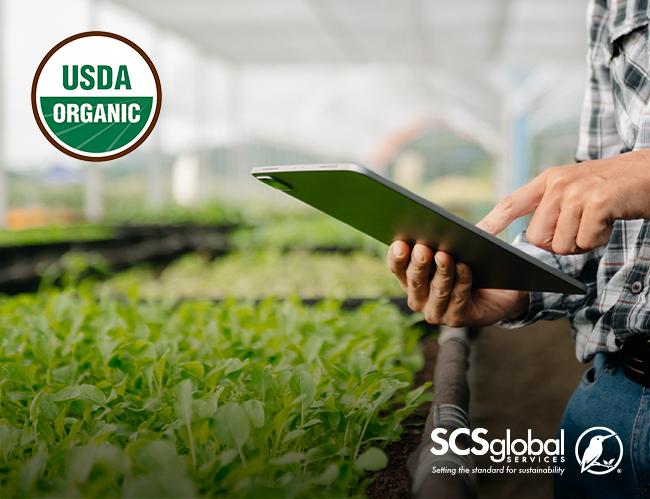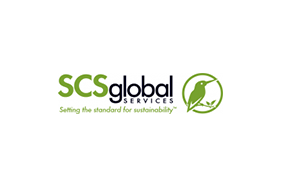Strengthening Organic Enforcement (SOE) Summary: Top Seven Changes To Watch As 2024 Deadline Nears
Published 03-05-24
Submitted by SCS Global Services

The United States Department of Agriculture (USDA) Strengthening Organic Enforcement (SOE) final rule represents the biggest change to the National Organic Program (NOP) since its founding in 2001. According to the Organic Trade Association (OTA), which played a significant role in the uptake of the new SOE rule, the update “closes gaps in the current regulations and builds consistent certification practices to detect and prevent fraud, improve the transparency and traceability of organic products across the supply chain, and protect organic integrity to support continued growth of the organic market.”
Companies can turn to a number of resources to learn more, including the full summary of the Organic Trade Association’s SOE final rule, the Federal Register’s formal communications about the SOE amendment, and an official side-by-side comparison of the original organic program regulatory language and the new SOE rule.
What’s the deadline to be compliant with the new SOE rule?
The deadline to be compliant with the new Strengthening Organic Enforcement (SOE) final rule is March 19, 2024. All impacted companies and organizations are expected to understand, have implemented, and be compliant with the SOE final rule by that date.
Who is impacted?
The USDA expects that the new SOE rule will impact all producers, processors, handlers of organic products, and all organic certifying agents and inspectors. In addition, organic supply chain participants who are currently not certified organic will need to be compliant.
Companies that have never had to become USDA Organic certified before will now need to comply with these standards if they want to continue being part of the organic supply chain. SCS Global Services leverages our 20 years of experience supporting companies with organic certification to offer these top seven SOE rule changes we believe companies need to be aware of now.
Top Seven Changes under the SOE Final Rule
1. Expanded organic certifications and new exemptions
The new SOE rule brings expanded organic certification requirements along with specific new (yet limited) exemptions, too. Of note is the expansion of certification to include operations that are “trading, facilitating sale or trade on behalf of a seller or oneself, importing, and/or exporting organic products,” explains the Organic Trade Association. Importantly, brokers, exporters, traders, and certain others that were previously considered exempt from certification will now have to become certified — unless these operations qualify for an exemption.
Operators can plan for certain low-risk activities to be considered exempt. Low-risk activities may include very small operations and certain retail outlets that, as OTA clarifies, do not process organic products or that “process” only in the sense of handling previously packaged and sealed organic products at the final point of sale. And while transporters that “only move organic products between certified operations or transload between modes of transportation” do not need to be individually certified, these operators in effect become the responsibility of the certified operations that load or receive the products.
2. NOP Import Certificates and the Organic Integrity Database
Under the SOE final rule, all imported organic products must be declared to US Customs and Border Patrol (CBP)’s Automated Commercial Environment (ACE) system using data that comes from an NOP (National Organic Program) Import Certificate.
The NOP Import Certificate is generated by the exporter’s accredited certifier in the NOP Organic Integrity Database (INTEGRITY), which acts as a registry of certified organic operations. NOP Import Certificates and the INTEGRITY database play an important role in the Strengthening Organic Enforcement final rule as certifiers will be able to systematically track and document operations’ various levels of compliance. Within the database, certifiers will also be able to deem certain operations as “transitional”— a formal designation meaning an operation is not yet fully certified.
According to the USDA’s formal communications in June 2023, there are a few benefits to designating certain operations as transitional in the database. Listed transitional operations may be eligible for transitional crop insurance, and completing an Organic System Plan (OSP) “provides an early mechanism for operations to connect with a certifier, learn the organic rules, and implement compliant systems with respect to practices, materials use, and recordkeeping.” In addition to helping certifiers build relationships with a transitional operation, the transitional process may also help prevent a potential and unexpected denial of organic certification at a later time.
3. Supply chain traceability and fraud prevention
The need to improve fraud prevention and traceability initiated an update to the existing organic rules, making this element of the SOE final rule stand out as significant and important. On a fundamental level, operations must “include a fraud prevention plan in their Organic System Plan (OSP),” writes OTA. Such plans should outline the “monitoring practices and procedures each operator uses to prevent organic fraud and verify suppliers and organic product status.” Operations will be expected to maintain records for each transaction, spanning the time of purchase or acquisition from production to sale or transport. These records must be traceable back to the last certified operation in their supply chain and should identify agricultural products as organic.
In this respect, certifiers will also be responsible for identifying high-risk operations and products as well as prepared to “conduct risk-based supply chain traceability audits” meant to identify and track movement of products along the entire supply chain. Notable movements along the supply chain include sale, custody, handling, and verification of organic status of products. The OTA emphasizes that certifiers will be expected to collaborate with each other on fraud investigations and report credible evidence of fraud to the USDA.
4. Labeling of non-retail containers
Another important part of the new SOE rule concerns non-retail containers, which must now include organic identification (abbreviations or acronyms are okay) and information such as a lot code that links the container to the audit trail documentation. The audit trail documentation associated with a non-retail container must identify the last certified operation that handled the product and share sufficient information and specifications to determine the source, transfer of ownership, and transportation of the product.
5. Organic certificates and data reporting
This section of the new SOE rule also expects certifiers to leverage data stored in the same Organic Integrity Database (INTEGRITY) mentioned in the NOP Import Certification section above. But the new guidance for organic certification and data reporting under SOE means certifiers will need to generate standardized organic certificates from INTEGRITY. The certificates are expected to use a standardized format and data fields. And while unique addenda are allowed to be attached to the certificates, addenda must include certain information such as the operation’s unique INTEGRITY identification number and a link to the operation’s profile in INTEGRITY.
Organic certificates and standardized reporting of data are an important part of the new SOE rule due to the role these components play in traceability and in supporting the greater effort to prevent fraud at every point along the supple chain. To that end, certifiers will need to maintain current and accurate data for all operations certified in INTEGRITY.
According to the OTA, a few of the mandatory data fields certifiers can expect to report through these certified forms are: certification status, scope(s) of certification, and the organic commodities products handled by the operation. Most important here is the mandatory reporting period of 72 hours from an operation’s suspension, revocation, or surrender of certification.
6. Producer group operations
Previously referred to as “grower groups,” producer groups have been and will continue to be eligible for organic certification under one Organic System Plan (OSP), notes OTA. For the first time, the SOE final rule adds “specific requirements for group certification to the NOP regulations”— this means that for producers to qualify for certification as a group, they must meet specific eligibility criteria. For example, members will need to be organized into production units, all of which use common production practices and inputs and use centralized collection, processing, distribution, marketing systems, and facilities.
Producer groups will need to use an Internal Control System (ICS) to ensure each member of the group is compliant with all organic requirements and is conducting internal inspections, maintaining traceability records, including other activities such as training, surveillance, and auditing. Each of these components works together to support the overall cohesion and compliance of the group.
Most importantly, this section of the SOE final rule involves how certifiers will be expected to verify the producer group’s overall compliance as documented in the group’s Internal Control System (ICS) through regular on-site inspections. In particular, the (ICS) will be used as the basis for assessing the producer group not only through on-site inspections, but also through the execution of witness audits of the internal inspectors and a direct inspection of a sample of individual members.
The USDA provides a precise calculation to help certifiers determine what percentage of members in a given producer group they should plan to inspect at least 1.4 times the square root of the total number of members or 2% of the total number of producer group members — however, the sampling rate will frequently be much higher. All high-risk members and all handling facilities must be inspected annually.
The USDA provides a side-by-side comparison of the original Organic Regulations language and the new text of the Strengthening Organic Enforcement final rule. And while the phrase ‘high-risk’ appears only twice in this comparison, it’s important to note that the USDA expects producer group members to define what they consider high-risk in their own Internal Control System — and then to document how they manage and handle these high-risk operations so that the group can maintain compliance.
7. On-site and unannounced inspections
Inspectors will be required to conduct mass-balance (“in-out”) and traceability (“trace-back”) audits during all annual on-site inspections. “Mass-balance audits verify that quantities of organic product and ingredients produced or purchased are used, stored, sold, or transported by the operation,” explains the OTA. Trace-back or traceability audits help ensure that organic products and ingredients can be traced from the time of purchase through production, sale, and transport.
Certifiers are responsible for conducting unannounced inspections of at least 5% of the operations they certify, explains OTA. And while an unannounced inspection can be limited in its scope, it still must be conducted without any advanced notice to the operator — precisely no more than four hours prior to the inspector arriving on-site.
Just a few weeks until the deadline—is your company prepared?
With the March 19 deadline fast approaching, any businesses in need of support navigating or adapting workflows to remain compliant with SOE regulations are encouraged by the USDA to take immediate action. At SCS, we are proud to act not only as a helpful source of knowledge and insight into these upcoming changes, but also as a strategic partner helping companies navigate the full SOE regulations and the entire USDA Organic certification process.
Where do I go to learn more about SOE?
SCS recommends starting with the full text of the final rule, the National Organic Program’s website, the Organic Trade Association’s (OTA) SOE Fact Sheet, and the Agricultural Marketing Service’s (AMS) SOE Fact Sheet. Also helpful is the USDA’s side-by-side comparison of the original organic regulation language and the new SOE.
_____
For more information, please contact:
Ned Halaby
Director of Sales – Product Claims
+1-510-993-0235

SCS Global Services
SCS Global Services
SCS is a leading third-party provider of certification, auditing and testing services, and standards, founded in 1984. Our goal is to recognize the highest levels of performance in food safety and quality, environmental protection and social responsibility in the private and public sectors, and to stimulate continuous improvement in sustainable development.
More from SCS Global Services

